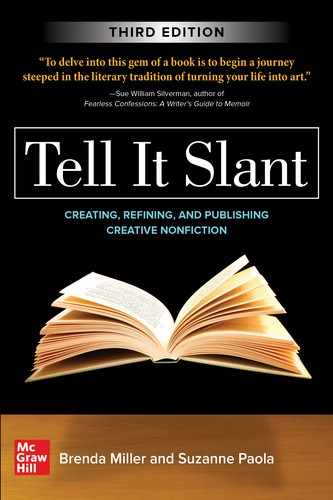1
The Fine Art of Sighing
You feel a gradual welling up of pleasure, or boredom, or melancholy. Whatever the emotion, it’s more abundant than you ever dreamed. You can no more contain it than your hands can cup a lake. And so you surrender and suck the air. Your esophagus opens, diaphragm expands. Poised at the crest of an exhalation, your body is about to be unburdened, second by second, cell by cell. A kettle hisses. A balloon deflates. Your shoulders fall like two ripe pears, muscles slack at last.
My mother stared out the kitchen window, ashes from her cigarette dribbling into the sink. She’d turned her back on the rest of the house, guarding her own solitude. I’d tiptoe across the linoleum and make my lunch without making a sound. Sometimes I saw her back expand, then heard her let loose one plummeting note, a sigh so long and weary it might have been her last. Beyond our backyard, above telephone poles and apartment buildings, rose the brown horizon of the city; across it glided an occasional bird, or the blimp that advertised Goodyear tires. She might have been drifting into the distance, or lamenting her separation from it. She might have been wishing she were somewhere else, or wishing she could be happy where she was, a middle-aged housewife dreaming at her sink.
My father’s sighs were more melodic. What began as a somber sigh could abruptly change pitch, turn gusty and loose, and suggest by its very transformation that what begins in sorrow might end in relief. He could prolong the rounded vowel of oy, or let it ricochet like an echo, as if he were shouting in a tunnel or a cave. Where my mother sighed from ineffable sadness, my father sighed at simple things: the coldness of a drink, the softness of a pillow, or an itch that my mother, following the frantic map of his words, finally found on his back and scratched.
A friend of mine once mentioned that I was given to long and ponderous sighs. Once I became aware of this habit, I heard my father’s sighs in my own and knew for a moment his small satisfactions. At other times, I felt my mother’s restlessness and wished I could leave my body with my breath, or be happy in the body my breath left behind.
It’s a reflex and a legacy, this soulful species of breathing. Listen closely: My ancestors’ lungs are pumping like bellows, men towing boats along the banks of the Volga, women lugging baskets of rye bread and pike. At the end of each day, they lift their weary arms in a toast; as thanks for the heat and sting of vodka, their aahs condense in the cold Russian air.
At any given moment, there must be thousands of people sighing. A man in Milwaukee heaves and shivers and blesses the head of his second wife who’s not too shy to lick his toes. A judge in Munich groans with pleasure after tasting again the silky bratwurst she ate as a child. Every day, meaningful sighs are expelled from schoolchildren, driving instructors, forensic experts, certified public accountants, and dental hygienists, just to name a few. The sighs of widows and widowers alone must account for a significant portion of the carbon dioxide released into the atmosphere. Every time a girdle is removed, a foot is submerged in a tub of warm water, or a restroom is reached on a desolate road . . . you’d think the sheer velocity of it would create mistrals, siroccos, hurricanes; arrows should be swarming over satellite maps, weathermen talking a mile a minute, ties flapping from their necks like flags.
Before I learned that Venetian prisoners were led across it to their execution, I imagined that the Bridge of Sighs was a feat of invisible engineering, a structure vaulting above the earth, the girders and trusses, the stay ropes and cables, the counterweights and safety rails, connecting one human breath to the next.
